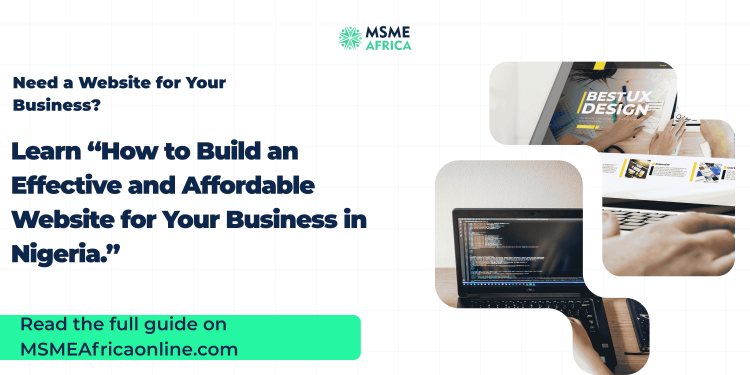A website is the digital home of your business. It’s how customers find, learn about, and connect with you. For African entrepreneurs and small business owners, having a professional website doesn’t have to cost a fortune. This guide explains how to build a simple, functional, and affordable business website that attracts customers, builds credibility, and supports growth.
Why Every Business Needs a Website
A website gives your business an identity that extends beyond your physical space. It allows people to reach you at any time and from anywhere. Customers are more likely to trust a brand that has an online presence because it feels legitimate and professional.
In Nigeria and across Africa, many businesses still rely only on social media pages. While platforms like Instagram and Facebook are useful, they can’t replace the control and credibility that a website offers. Your website becomes your owned digital asset, one that represents your brand on your terms.
As we said earlier, digital presence is one of the strongest growth drivers for small businesses today. Entrepreneurs who invest in a website are better positioned to access new markets, attract investors, and gain customer trust.
Step 1: Define Your Purpose and Audience
Before building your website, know what you want it to achieve. Ask yourself:
- Do you want to sell products online?
- Do you want to showcase your services?
- Are you trying to attract new clients or investors?
Understanding your goals will help you decide what features to include, such as an online store, booking form, or blog.
Also, define your target audience. A fashion entrepreneur in Lagos, for instance, may want a visually driven website, while a B2B services company might focus more on professionalism and clarity.
Step 2: Choose the Right Domain Name
Your domain name is your website’s address. Keep it short, simple, and relevant to your business name. For African businesses, using a .com.ng, .ng, or .africa extension can help with local visibility.
Platforms like Whogohost and Truehost Africa allow you to buy domains affordably, often for less than ₦7,000 per year.
Step 3: Pick a Reliable Hosting Plan
Hosting determines how fast your website loads and how secure it is. For small businesses, shared hosting plans are affordable and effective. As your business grows, you can upgrade to cloud or VPS hosting for better performance.
Look for providers that offer:
- 24/7 customer support
- At least 99% uptime
- SSL certificate (for website security)
Step 4: Select an Easy Website Builder or CMS
You don’t need to be a tech expert to build a good website. Many tools are beginner-friendly and affordable. Some popular options include:
- WordPress – Ideal for blogs, portfolios, and service websites.
- Wix or Squarespace – Great for visual brands like fashion or art.
- Shopify – Best for e-commerce stores.
- Flutterwave Store or Paystack Storefront – Perfect for small African businesses that want to sell online quickly.
These tools offer ready-made templates that you can customize with your logo, brand colors, and text.
Step 5: Create High-Quality, Clear Content
Good content keeps visitors on your website. Write in a tone that fits your audience, simple, direct, and authentic. Each page should clearly explain what you do and how customers can contact you or buy from you.
Key pages to include:
- Home Page: Summarizes who you are and what you offer.
- About Page: Shares your story and mission.
- Products/Services Page: Lists your offerings with clear prices and benefits.
- Contact Page: Includes phone, email, social links, and a form.
- Blog (Optional): Shares helpful content related to your industry.
You can Also Read 15 Social Media Management Tools That Will Make Life Easier for You – Dear Nigerian Entrepreneur
Step 6: Optimize Your Website for SEO
Search Engine Optimization (SEO) helps your website appear on Google when people search for your services. Follow these tips:
- Use simple, descriptive titles and meta descriptions.
- Include keywords like “affordable in Nigeria in your text.
- Add alt text to images so search engines understand them.
- Ensure your website loads quickly; speed affects ranking.
- Make your site mobile-friendly since most Africans browse on phones.
Step 7: Add Basic Integrations
To make your website more functional, connect it with useful tools such as:
- Google Analytics – Tracks visitors and helps measure performance.
- Email marketing tools – Build mailing lists with platforms like Mailchimp or ConvertKit.
- Social media links – Let customers easily connect to your pages.
- Payment gateways – For online stores, integrate Flutterwave, Paystack, or Stripe.
Step 8: Keep It Updated and Secure
Regularly check your website for broken links, outdated information, or security issues. Update your content often, especially your blog or product listings, to keep it fresh and engaging.
Use strong passwords and enable SSL to protect customer data. For extra security, schedule automatic backups with your hosting provider.
Step 9: Promote Your Website
Having a website isn’t enough; you need people to visit it. Promote it by:
- Adding the link to your business cards and social media bios.
- Running small Facebook or Google Ads campaigns.
- Sharing blog posts on LinkedIn, Twitter, or WhatsApp groups.
- Listing your business on Google My Business for local visibility.
For more visibility strategies, check out How to Build a Strong Business Network in Nigeria (Even if You’re an Introvert)
Building a website for your African business doesn’t have to be expensive or complicated. With the right tools, planning, and consistent updates, you can create an online home that grows your brand and helps you reach more customers.
Think of your website as an investment, one that builds trust, drives sales, and strengthens your digital identity.
FAQs
1. How much does it cost to build a business website in Nigeria?
You can start with as little as ₦20,000–₦50,000 using affordable domain, hosting, and templates. Advanced custom designs may cost more.
2. Can I build a website without coding knowledge?
Yes. Platforms like WordPress, Wix, and Shopify allow you to create websites with drag-and-drop tools, no coding required.
3. What is the best hosting service for Nigerian small businesses?
Local options like Whogohost and Truehost Africa offer affordable plans and good customer support.
4. How can I make my website show up on Google?
Use relevant keywords, update your site regularly, get backlinks, and register your business on Google My Business.
5. Should I hire a web designer or do it myself?
If you’re on a tight budget, start with a DIY builder. As your business grows, you can hire a professional to improve design and performance.
6. What makes a good business website?
It should be easy to use, mobile-friendly, visually consistent, and focused on helping visitors find information quickly.
7. How often should I update my website?
Review it at least every three months or whenever you make changes to your products, pricing, or contact details.










